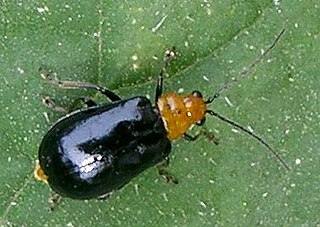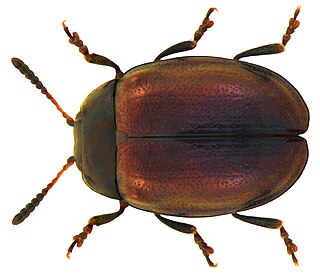| Platysternus | |
|---|---|
| Scientific classification | |
| Kingdom: | Animalia |
| Phylum: | Arthropoda |
| Class: | Insecta |
| Order: | Coleoptera |
| Suborder: | Polyphaga |
| Family: | Cerambycidae |
| Genus: | Platysternus |
| Species: | P. hebraeus |
| Binomial name | |
| Platysternus hebraeus (Fabricius, 1781) | |
Platysternus is a monotypic beetle genus in the family Cerambycidae described by Pierre François Marie Auguste Dejean in 1835. Its only species, Platysternus hebraeus, was described by Johan Christian Fabricius in 1781. [2]

Beetles are a group of insects that form the order Coleoptera, in the superorder Endopterygota. Their front pair of wings are hardened into wing-cases, elytra, distinguishing them from most other insects. The Coleoptera, with about 400,000 species, is the largest of all orders, constituting almost 40% of described insects and 25% of all known animal life-forms; new species are discovered frequently. The largest of all families, the Curculionidae (weevils) with some 70,000 member species, belongs to this order. Found in almost every habitat except the sea and the polar regions, they interact with their ecosystems in several ways: beetles often feed on plants and fungi, break down animal and plant debris, and eat other invertebrates. Some species are serious agricultural pests, such as the Colorado potato beetle, while others such as Coccinellidae eat aphids, scale insects, thrips, and other plant-sucking insects that damage crops.

Pierre François Marie Auguste Dejean, was a French entomologist. A soldier of fortune during the Napoleonic Wars, he rose to the rank of lieutenant general and aide de campe to Napoleon. He amassed vast collections of Coleoptera, some even collected on the battlefield at Waterloo. He listed 22,399 species in his cabinets in 1837—at the time, the greatest collection of Coleoptera in the world. In 1802, he began publishing a catalogue of his vast collection, including 22,000 species names. Dejean was an opponent of the Principle of Priority in nomenclature. "I have made it a rule always to preserve the name most generally used, and not the oldest one; because it seems to me that general usage should always be followed and that it is harmful to change what has already been established". Dejean acted accordingly and often introduced in litteris names, given by himself to replace those already published by other authors. They became invalid. Dejean was president of the Société entomologique de France for the year 1840. In 1834, he was elected a foreign member of the Royal Swedish Academy of Sciences. He died on 17 March 1845.

Johan Christian Fabricius was a Danish zoologist, specialising in "Insecta", which at that time included all arthropods: insects, arachnids, crustaceans and others. He was a student of Carl Linnaeus, and is considered one of the most important entomologists of the 18th century, having named nearly 10,000 species of animals, and established the basis for the modern insect classification.









